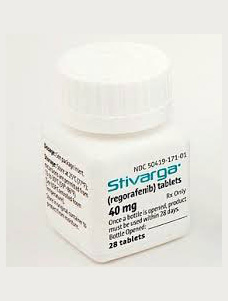Stivarga
Stivarga contains the active substance regorafenib. It is a medicine used to treat cancer by slowing down the growth and spread of cancer cells and cutting off the blood supply that keeps cancer cells growing.
Stivarga is used to treat colon or rectal cancer that has spread to other parts of the body in adult patients who have received other treatments or cannot be treated with other medicines (fluoropyrimidine-based chemotherapy, an anti-VEGF therapy and an anti-EGFR therapy).
If you have any questions about how Stivarga works or why this medicine has been prescribed for you, please ask your doctor
The recommended dose is 160 mg regorafenib (four 40 mg tablets) taken orally once daily for the first 21 days of each 28day cycle. Continue treatment until disease progression or unacceptable toxicity.
Take Stivarga at the same time each day. Swallow tablet whole with water after a low-fat meal that contains less than 600 calories and less than 30% fat [see CLINICAL PHARMACOLOGY]. Do not take two doses of Stivarga on the same day to make up for a missed dose from the previous day.
Severe drug induced liver injury with fatal outcome occurred in 0.3% of 1200 Stivarga-treated patients across all clinical trials. Liver biopsy results, when available, showed hepatocyte necrosis with lymphocyte infiltration. In Study 1, fatal hepatic failure occurred in 1.6% of patients in the regorafenib arm and in 0.4% of patients in the placebo arm; all the patients with hepatic failure had metastatic disease in the liver. In Study 2, fatal hepatic failure occurred in 0.8% of patients in the regorafenib arm [see ADVERSE REACTIONS].
Obtain liver function tests (ALT, AST and bilirubin) before initiation of Stivarga and monitor at least every two weeks during the first 2 months of treatment. Thereafter, monitor monthly or more frequently as clinically indicated. Monitor liver function tests weekly in patients experiencing elevated liver function tests until improvement to less than 3 times the ULN or baseline.
Get emergency medical help if you have any of these signs of an allergic reaction: hives; difficult breathing; swelling of your face, lips, tongue, or throat.
Stop using regorafenib and call your doctor at once if you have:
1. fever, chills, flu symptoms, mouth sores, severe or ongoing vomiting or diarrhea;
2. feeling very thirsty or hot, being unable to urinate, heavy sweating, or hot and dry skin;
3. blood in your urine or stools, coughing up blood or vomit that looks like coffee grounds;
4. heavy menstrual periods or abnormal vaginal bleeding;
5. any bleeding that will not stop;
6. chest pain and severe dizziness, fainting, feeling short of breath;
7. headache, confusion, change in mental status, vision loss, seizure (convulsions);
8. upper stomach pain, itching, loss of appetite, dark urine, clay-colored stools, jaundice (yellowing of the skin or eyes);
9. dangerously high blood pressure (blurred vision, buzzing in your ears, anxiety, uneven heartbeats);
